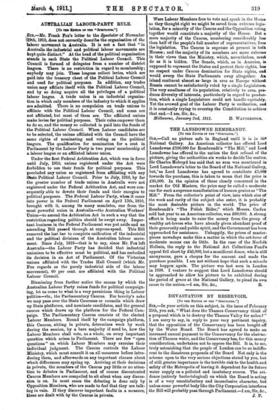AUSTRALLLIT LABOUR-PARTY RULE. [To esa Farm ow ere srseraeos."1
Sin,—Mr. Frank Fox's letter to the Spectator of November 419th, L910, does not correctly describe the organisation of the labour movement in Australia. It is not a fact that "in Australia the industrial and political labour movements are kept quite distinct." At the head of the political organisation stands in each State the Political Labour Council. This Council is formed of delegates from a number of district leagues. There is no restriction in regard to membership ; anybody may join. These leagues collect levies, which are paid into the treasury chest of the Political Labour Council and used for political purposes. In addition, any trades union may affiliate itself with the Political Labour Council, and by so doing acquire all the privileges of a political labour league. A trade union is an industrial organisa- tion in which only members of the industry to which it applies are admitted. There is no compulsion on trade unions to affiliate with the Political Labour Council, and some are not affiliated, but most of them are. The affiliated unions make levies for political purposes. Their rules empower them to do so, and the money so collected is paid into the funds of the Political Labour Council. When Labour candidates are to be selected, the unions affiliated with the Council have the same rights of nominating and voting as the political leagues. The qualification for nomination for a Beat in Parliament by the Labour Party is two years' membership of a labour league or an affiliated labour union.
Under the first Federal Arbitration Act, which was in force until July, 1910, unions registered under the Act were forbidden to use their funds for political purposes. This precluded any union so registered from affiliating with any State Political Labour Council. Prior to July, 1910, by far the greater number of trade unions in Australia were not registered under the Federal Arbitration Act, and were con- sequently able to devote their funds and their energies to political purposes. The Federal Labour Party, when it came into power in the Federal Parliament on April 13th, 1910, brought with it, among its many mandates, one from the most powerful union in Australia—the Australian Workers' Union—to amend the Arbitration Act in such a way that the restriction regarding politics should be swept away. Impor- tant business in the Federal Parliament was put aside and an amending Bill passed through at express speed. This Bill removed the last bar to complete unification of the industrial and the political divisions of the Australian labour move- ment. Since July, 1910—that is to say, since Mr. Fox left Australia—the Labour Party has decided that industrial unionism to be effective must be political, and has embodied its decision in an Act of Parliament. Of the Victorian unions affiliated with the Trades Hall Council (which Mr. Fox regards as the purely industrial side of the labour movement), 60 per cent. are affiliated with the Political Labour Council.
Dismissing from further notice the means by which the Australian Labour Party raises fends for political campaign- ing, let us come to what is a very pernicious thing in Labour politics—viz., the Parliamentary Caucus. For brevity's sake we may pass over the State Caucuses or councils which draw up State platforms, and nominate candidates, and the general caucus which draws up the platform for the Federal Cam- paign. The Parliamentary Caucus consists of the elected Labour Members. Bound itself by the campaign platform, this Caucus, sitting in private, determines week by week during the session, by a bare majority if need be, how the Labour Members shall vote, as a whole, on every important question which arises in Parliament. There are few "open questions" on which Labour Members may exercise their individual judgment. The Caucus controls the Labour Ministry, which must consult it on all measures before intro- ducing them, and afterwards on any important clauses about winch differences may spring up. Arriving at their decisions in private, the members of the Caucus pay little or no atten- tion to debates in Parliament, and of course discontented Caucus Members are compelled to sit silent when any discus- sion is on. In most cases the debating is done only by Opposition Members, who are made to feel that they are talk- ing in vain. If they discover important faults in a measure, these are dealt with by the Caucus in private.
Were Labour Members free to vote and speak in the House as they thought right we might be saved from extreme legis- lation, for a minority of the Caucus and the Opposition voting together would constitute a majority of the House. But a mere majority of the Caucus, numbering considerably lees than half of the people's full number of representatives, fixes the legislation. The Caucus is supreme at present in both Houses ; and the majority of its members are more extreme in their views than the Ministry, which, nevertheless, must do as it is bidden. The Senate, which, as in America, is supposed to represent the States and protect their rights, has no respect under Caucus domination for State rights, and. would sweep the State Parliaments away altogether. Au island continent almost as. large in area as Europe without Russia cannot be satisfactorily ruled by a single Legislature. The very smallness of its population, relatively to area, pro- duces diversity of interests, particularly in regard to produc- tion, which a single Legislature could not handle equitably. Yet the avowed goal of the Labour Party is unification, mull it is constantly trying to overstep the Constitution to achieve that end.—I am, Sir, &c.,
Melbourne, January 2nd, 1911. D. WATTERSTON.










































 Previous page
Previous page